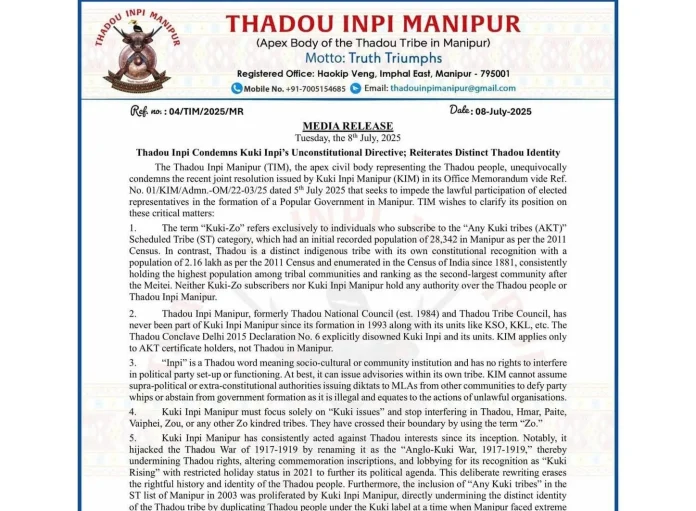IMPHAL, July 9: The Thadou Inpi Manipur (TIM), the apex body representing the Thadou tribe in Manipur, has unequivocally condemned a recent directive issued by the Kuki Inpi Manipur (KIM), calling it unconstitutional, extra-legal, and an infringement upon democratic processes. The condemnation follows KIM’s July 5 resolution, which TIM claims seeks to impede the lawful participation of elected representatives in the formation of a popular government in the state.
In a press release issued on July 8, TIM emphasized that KIM has no authority whatsoever over the Thadou people, who are a distinct indigenous tribe with separate constitutional recognition under the Scheduled Tribes (ST) list, with a population of 2.16 lakh as per the 2011 Census, making them the largest tribal group in Manipur. In contrast, the statement notes that the “Any Kuki Tribes (AKT)” ST category, which the term “Kuki-Zo” refers to, had an initial population of just 28,342 in the state.
“Neither Kuki-Zo subscribers nor Kuki Inpi Manipur hold any authority over the Thadou people or Thadou Inpi Manipur,” TIM stated. It reaffirmed that Thadou Inpi, which evolved from the Thadou National Council (est. 1984) and Thadou Tribe Council, has never been part of Kuki Inpi Manipur or its affiliated units like KSO and KKL since KIM’s formation in 1993. The Thadou Conclave Delhi 2015 Declaration No. 6 explicitly disowned any association with KIM.
Clarifying the meaning of the term “Inpi,” TIM pointed out that it is a Thadou word denoting a socio-cultural or community institution, and does not confer political authority. It asserted that KIM cannot assume supra-political or extra-constitutional powers, especially those aimed at directing or restraining MLAs—a move TIM compared to actions of unlawful organisations.
TIM also criticized KIM for repeatedly interfering in the affairs of other Zo kindred tribes, such as the Thadou, Hmar, Paite, Vaiphei, and Zou, and urged it to restrict itself solely to “Kuki issues.”
A major historical grievance highlighted by TIM is the renaming of the Thadou War of 1917–1919 to the “Anglo-Kuki War”, which it sees as a deliberate undermining of Thadou contributions and historical identity. The statement accused KIM of lobbying to have the conflict recognized as “Kuki Rising” and for it to be given a restricted holiday status in 2021, which TIM views as a politically motivated rewriting of history.
TIM further stated that the 2003 inclusion of “Any Kuki Tribes” in the ST list of Manipur was orchestrated by KIM, calling it a direct threat to the Thadou tribe’s identity, especially during a time when Manipur was facing significant fragmentation due to the Centre’s NSCN-IM ceasefire extension without territorial limits.
The press release also noted that Thadou people reside throughout Manipur and have actively participated in democratic processes, including elections to MDCs, MLAs, and MPs. It specifically mentioned that among the ten Zo MLAs currently supporting the demand for Separate Administration (SA), three—Nemcha Kipgen, Letpao Haokip, and Haokholet Kipgen—hold Thadou ST certificates. TIM warned that any attempt to pressure or intimidate these legislators in the execution of their constitutional responsibilities—such as participating in government formation—would be illegal and unacceptable.
“If any of them wish to identify as Kuki, they should obtain AKT certificates and stop prostitutioning the Thadou identity by obtaining Thadou ST Certificate,” the statement asserted. It also made it clear that no external force has the right to disturb or coerce any MLA holding a Thadou certificate.
TIM warned that Kuki Inpi Manipur could face criminal prosecution if its actions are found to constitute intimidation, criminal conspiracy, obstruction of public functionaries, or sedition, under various Indian laws including the Representation of the People Act (1951), Indian Penal Code/BNS, and the Unlawful Activities (Prevention) Act (1967).
The statement concluded by reaffirming TIM’s commitment to peace, democratic values, and the harmonious coexistence of all indigenous communities in Manipur.

